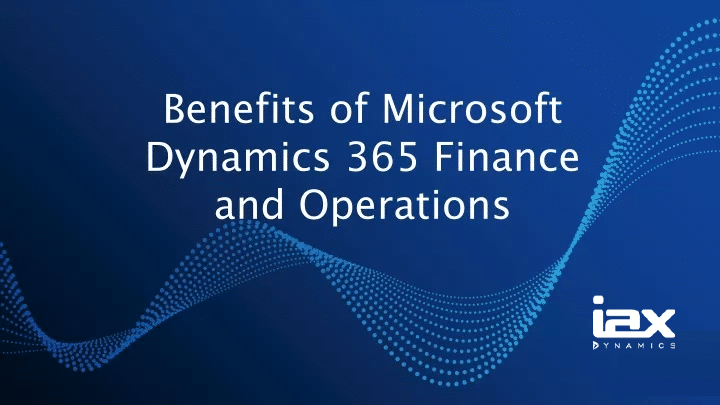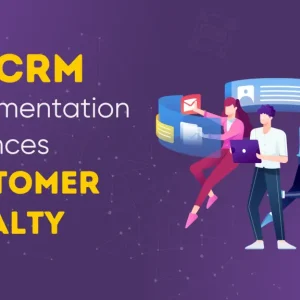Today’s digital environment demands that organizations move to the cloud. Organizations may choose Microsoft cloud for improved security, collaboration, and easy integration with their business.
Organizations must set the path for creating value through advanced technologies. Today’s business solutions are capable of taking business growth to a new level. For example, Microsoft Dynamics 365 for business excels among leading solutions and is advanced with AI and cloud features.
It is clearly the Dynamics 365 Finance and Operations ERP that is designed to manage core business processes. Whether it is finance, sales, or operations, the ERP and CRM in Dynamics 365 have you covered.
It would make sense to know what this Dynamics 365 for Business is, right?
Finance and Operations is an ERP solution designed for managing core business functions, mainly finance, project operations, and supply chain operations. But it can be combined with other apps such as sales, customer service, project operations, and others for a complete solution.
Running individual systems for finance, sales, and operations is almost improbable in the modern business environment.
There would be no synchronization between systems, and when it is needed, third party connectors are often required, which is a costly and cumbersome process. This leads to inconsistent data flow between departments and creates data silos that hamper efficacy and decision making.
This is where Dynamics 365 for business comes into the picture. It provides a solution that combines operations into a unified platform.
Unified Data Management
Modern business demands easy operations between departments like finance, sales, and all aspects of supply chain operations.
Finance and Operations connects data across various departments, including finance, supply chain, inventory, sales, and customer service. It breaks down data silos and make certain users have access to the latest data.
By unifying data, businesses gain real time access to critical information which is useful for reporting and faster decision making across finance and supply chain operations.
Financial management
D365 Finance and Operations helps organizations gain control over their financial processes. Manage both the inflow and outflow of cash with the cash flow forecasting tool, create precise budgets with the intelligent budgeting feature, and identify late customer payments. These AI capabilities bring a solution to manage finances and address any issues through proactive steps.
Basic financial management features support managing finances better. They include general ledger, accounts receivable and payable, cash and bank management, fixed asset management, and more.
Automation of tedious finance processes frees up employee time to focus on more strategic activities.
Manage Supply Chain Operations
D365 Supply Chain module gives visibility into supply chain operations. Critical supply chain processes covered include procurement and sourcing, inventory management, demand forecasting, warehouse operations, distribution, and transportation. These processes are backed by AI, which is a plus for precise operations.
Inventory is properly managed across all storage locations for reducing stockout and overstock risks. It makes procurement and sourcing easier through automation, which helps improve supply chain routes, and make certain timely delivery of products. AI provides an edge in maintaining proper supply chain operations, which leads to increased operational performance and customer satisfaction.
Sales Management
D365 F&O does not include a sales module, but D365 sales module can be added to support the entire sales process. Integration of the sales module facilitates easy data flow into finance and other departments, providing a view of customer interactions, orders, and revenue.
This synchronization gives users a clear picture of inventory being utilized, purchase requirements, sales in the pipeline, and the financial aspects. Users can create and manage sales orders, track customer information, order history, and payments, automate sales quotations, and make certain coordination between sales, finance, and operations.
The coordination of these processes makes it easier for organizations to close sales deals faster and deliver on customer commitments smartly.
Analytics and reporting
The business software gives robust analytics and reporting capabilities that let organizations to make decisions. Analytics feature analyze data and give insights into key areas such as finance, supply chain, inventory, and operations.
These insights are visualized through dashboards and advanced reporting tools which offers a clear view of business performance. This help organizations make informed decisions, improve performance, and achieve their business goals.
Manage Finance, Sales, and Operations in One Place
The ERP unites core processes into a single platform. This makes it easier to manage sales, finance, and operations from a single location
Finance teams become aware of cash flow, budgeting, and compliance. Sales teams can manage the entire sales process. Supply chain operations are managed through inventory management, demand forecasting, procurement, and timely order fulfilment. This combination creates an environment where businesses can thrive with improved sales and revenue.
In addition, project operations can be managed by combining Dynamics 365 project planning with ERP.
Moving ahead in the competitive landscape is vital. In such a modernized environment, Microsoft Dynamics 365 implementation is a good choice for improved operations. A Dynamics 365 service provider offers expert consultation for the successful implementation of Microsoft ERP solutions.
To learn more about Dynamics 365 for business, you can get in touch with IAX DYNAMICS, the leading Microsoft partner for D365 business solutions across all types of industries.
FAQ Section
What is Finance and Operations, and how does it benefit businesses?
Finance and Operations is a ERP software for managing financial and supply chain operations. It improves processes with AI and automation, and integrates easily with Microsoft technologies This helps improves performance, reduce costs, and drive growth.
How does ERP support financial management?
ERP combines features for cash flow management, creating smart budgets, and identifying late payments. It also automates bank reconciliation, accounts receivable, and accounts payable for managing finances smartly.
Can F&O improve supply chain operations?
Yes, it includes advanced supply chain management features such as inventory optimization, procurement automation, warehouse management, and real time shipment updates.




